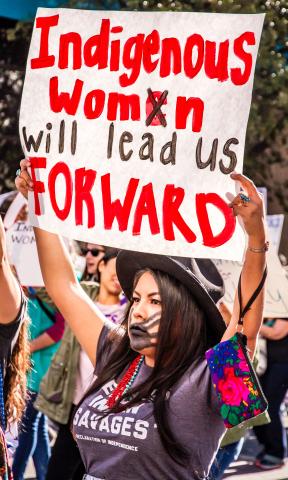
Leslie Varley, an urban Nisga’a woman has roots in matrilocal coastal fishing communities of the Northwest coast. In her social justice work she links arms with likeminded leaders committed to advancing necessary social change. She heads up the BC Association of Aboriginal Friendship Centres, an umbrella organization advocating for services and supports for the 25 Indigenous services centres throughout BC. Leslie brings an ambitious and determined decolonizing anti-racist focus to her volunteer community work. Her favourite places are the inlets coves and bays on the southwest Pacific coast. Her education includes a Master’s in Business Administration from Simon Fraser University.
Summer Rain. Summer Rain’s traditional Haida name is Xuuj dagwiitaa jaad, which means “Strong grizzly bear woman.” She is currently the manager of direct services and Indigenous women’s programs at Battered Women’s Support Services. She is also the co-chair of the Downtown Eastside Women’s Centre board of directors.
Rain has spent the last 18 years on the frontlines in the anti-violence movement. She is an active member of the DTES community. Her passion and work revolves around advocating for and raising awareness on missing and murdered Indigenous women and girls and gender diverse people, responding to sexual assault/gender based violence, and challenging, holding to account and exposing the flaws within the institutional settings of child welfare, policing and the court system. Rain is an outspoken and passionate advocate who has committed her work to demanding not only justice but change.
Kirstin Scansen-Isbister is a research and policy analyst with BWSS. She is a Woods Cree woman, and a member of the Lac La Ronge Indian Band in northern Saskatchewan. She has a Bachelor of Arts in sociology and political science from the University of British Columbia and a Master of Arts in Indigenous governance from the University of Victoria. Kirstin is passionate about serving Indigenous women, families and communities and has spent her career thus far in program development and coordination roles, health and environmental policy research and youth and student support services. Kirstin is committed to learning traditional Cree skills and land-based knowledges, and enjoys fishing, berry, mushroom and medicine picking with her family in northern Saskatchewan, as well as hiking, swimming, cycling and snowshoeing. Kirstin lives on the traditional, ancestral and unceded territory of the kʷikʷəƛ̓əm (Kwikwetlem First Nation).
